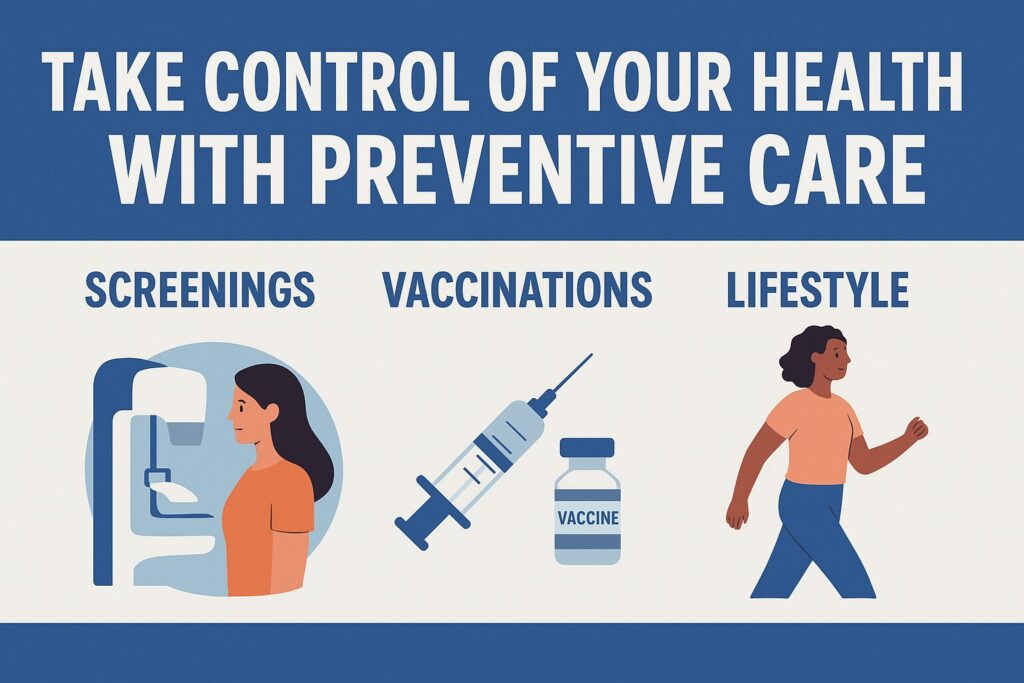Major Takeaways:
Routine screenings and early detection can save lives and prevent serious illnesses.
Staying current on vaccinations protects both individuals and communities.
Healthy lifestyle choices, including diet, exercise, and sleep, significantly improve long-term health outcomes.
Take Control of Your Health with Preventive Care: Screenings, Vaccinations, and Healthy Lifestyle Choices
Taking control of your health is one of the most important decisions you can make for yourself and your community. Preventive care is more than a personal choice. It is a strategy that helps you detect issues early, prevent serious illnesses, and create a foundation for long-term well-being. By staying on top of routine screenings, keeping vaccinations up to date, and making informed lifestyle choices, you can protect yourself, your family, and the people around you.
Preventive care is not just about avoiding illness. It is about living your best life, improving quality of life, and setting an example for your community. It is about taking actionable steps now to ensure you enjoy years of health and vitality while reducing the risk of costly medical emergencies later.
Routine Screenings: Detect Health Issues Early
Routine screenings are a cornerstone of preventive health care. They allow doctors to detect conditions such as colorectal cancer, breast cancer, cervical cancer, and lung disease before they progress. Catching problems early significantly increases the chances of successful treatment and long-term survival.
Screenings like colonoscopies, mammograms, Pap tests, and low-dose CT scans are essential tools. Colonoscopies allow doctors to find polyps that could turn into cancer and remove them before they develop. Mammograms detect breast cancer in its early stages, which is critical for treatment success. Pap tests can identify cervical cell changes before they become cancerous. Low-dose CT scans can detect lung cancer early, especially in people who are at higher risk due to smoking or environmental factors.
Healthcare providers recommend annual mammograms for women between ages 45 and 54. Colorectal screenings are now suggested starting at age 45. Cardiovascular screenings, including monitoring blood pressure, cholesterol, and blood sugar levels, are essential in preventing strokes, heart attacks, and other serious complications. Regular screenings empower individuals to make informed choices, address issues early, and contribute to a healthier community overall.
Early detection is not just a personal benefit. Communities with higher preventive care participation rates have lower overall healthcare costs, fewer hospital admissions, and healthier populations. Making screenings a priority is an investment that pays dividends in both health and economic terms.
Vaccinations: Protect Yourself and Your Community
Vaccines are an essential part of preventive care at every age. While many people associate vaccines with children, staying up to date as an adult protects you and those around you. Vaccinations prevent the spread of infectious diseases and can significantly reduce the risk of severe illness or hospitalization.
For 2025, important vaccine updates include the pneumococcal vaccine, which is now recommended starting at age 50 rather than 65. COVID-19 booster recommendations have expanded for adults 65 and older, and there are new vaccines such as PCV21 and the mRNA RSV vaccine. Staying informed about vaccine updates is critical. Consulting the CDC schedule and speaking with a healthcare provider ensures that you are following the most current guidelines.
Vaccinations are not only personal protective measures but also community protective measures. Higher immunization rates reduce the likelihood of outbreaks and safeguard vulnerable populations, including infants, the elderly, and those with chronic conditions. Protecting yourself is a powerful act of community service.
Daily Lifestyle Choices: Small Steps, Big Impact
Preventive care extends beyond routine medical visits. The everyday choices you make about diet, exercise, sleep, and stress management play a huge role in maintaining health.
Eating a diet rich in fruits, vegetables, whole grains, and healthy fats can prevent chronic illnesses and extend life. Research suggests that incorporating more plant-based foods can add several years to your life while lowering the risk of heart disease, diabetes, and certain types of cancer. Reducing the consumption of processed foods and sugary drinks is equally important for long-term health.
Exercise is one of the most effective ways to prevent disease. Walking 7,500 steps daily can reduce the risk of type 2 diabetes by more than 40 percent. Engaging in just 21 minutes of brisk walking each day can lower the risk of heart disease by 30 percent. Physical activity also supports mental health, boosts energy levels, helps manage weight, and strengthens muscles and bones.
Sleep and stress management are equally critical. Chronic sleep deprivation increases the risk of obesity, heart disease, and mental health issues. High stress levels can elevate blood pressure, weaken immunity, and increase inflammation in the body. Practices such as meditation, deep breathing exercises, journaling, or even spending time outdoors can dramatically improve mental and physical well-being.
Lifestyle choices also set a powerful example for others. Families and communities benefit when individuals prioritize healthy habits. Kids are more likely to eat vegetables and exercise when their parents lead by example. Communities with higher participation in healthy behaviors experience lower rates of preventable diseases and stronger overall resilience.
Affordable Preventive Care: Accessible for Everyone
Cost should never be a barrier to preventive care. Thanks to the Affordable Care Act, many essential screenings, vaccinations, and chronic disease management services are available at no out-of-pocket cost. This includes cancer screenings, immunizations, blood pressure and cholesterol checks, and diabetes management.
Digital tools like MyHealthfinder make preventive care even more accessible by providing personalized health recommendations in English and Spanish. The platform also offers community resources, clinic locators, and reminders for upcoming screenings or vaccinations.
Medicare and Medicaid ensure that older adults and low-income individuals have access to preventive care services. Clinics and local health centers also provide affordable screenings and vaccinations for those without insurance. These resources make it possible for everyone to take proactive steps in safeguarding their health.
The Economic and Long-Term Benefits of Prevention
Preventive care is not only beneficial for your health but also for your finances. Staying up to date with screenings, vaccines, and wellness visits can reduce healthcare costs by up to 30 percent. Preventive strategies help avoid expensive hospitalizations, long-term treatments, and complications from chronic diseases.
Personalized preventive programs can save individuals between $150 and $300 per month after three years. Reducing chronic disease management costs, cutting hospital stays, and avoiding costly emergency treatments create tangible long-term savings. Communities benefit as well, with reduced healthcare spending, more productive workforces, and improved quality of life.
Beyond finances, preventive care is an investment in your future. People who prioritize prevention often experience fewer illnesses, more energy, and higher overall satisfaction with life. Prevention gives you the ability to enjoy life fully, participate in community activities, and be present for family and friends.
Taking Action: Start Today
The best time to prioritize your health is now. Schedule your routine screenings, check your vaccination status, and adopt lifestyle habits that support long-term wellness. Every action counts. Even small steps, such as adding more fruits and vegetables to your meals, taking a short walk each day, or getting a recommended vaccine, can have a profound impact on your health.
Prioritizing preventive care is a commitment to yourself and your community. It is a way to ensure that you live longer, stronger, and more vibrant. By investing in your health today, you set a powerful example for others and help build a healthier, more resilient community.
For more information on preventive care, health tips, and resources, visit urbancitypodcast.com and take the first step toward a healthier future today.












